Recent news items have noted the fears of several individuals that QE2 will spark rapid inflation, e.g. [1]. For instance, Representative Paul Ryan, expected to become the Chairman of the House Budget Committee in January, stated: “I think it’s going to give us a big inflation problem down the road.”
Here are what various market-based indicators suggest.
First, I show the daily observations on the break even rates for TIPS (and hence the expected inflation rates, under certain assumptions):
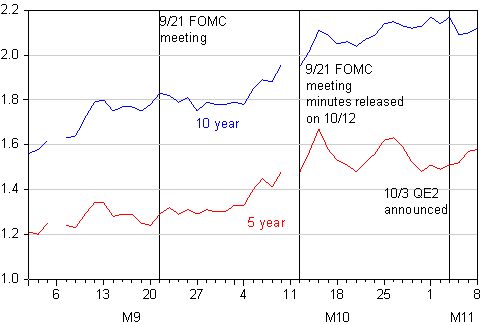
Figure 1: Difference between 10 year constant maturity Treasury yields and corresponding TIPS yields (blue), and difference at 5 year constant maturity (red), daily frequency. Source: FRED II, and author’s calculations.
Notice that, like the value of the dollar, there has been some movement over time as market participants ascribed a higher and higher likelihood of a QE2. That is, inflation expectations have trended higher.
However, these movements have to be put into context. If the expectations hypothesis of the term structure (EHTS) holds, then these movements imply that as of 11/8, the average inflation rate over the next five years will be a breathtaking 1.6%! Further, it is useful to place these expected inflation rates in temporal perspective. Figure 2 depicts these same series, on a monthly basis, since 2003 (when the constant maturity series for the TIPS begins).
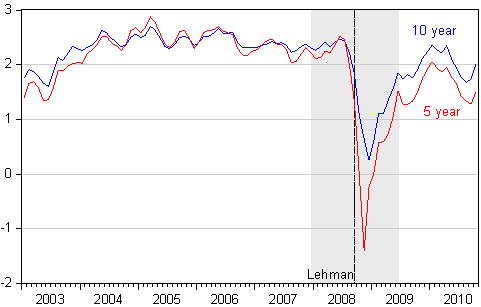
Figure 2: Difference between 10 year constant maturity Treasury yields and corresponding TIPS yields (blue), and difference at 5 year constant maturity (red). NBER recession dates shaded gray. Source: FRED II, NBER, and author’s calculations.
Expected average inflation over the next five years is still below the rates implied over the entire 2004-2007 period.
As many observers have noted, the simple EHTS probably does not hold; there is likely an inflation-based risk premium which rises with maturity of the instrument. Hence, one would like to control for this effect. The Cleveland Fed has attempted to make this adjustment, combined with a model based measure of inflation based upon surveys and inflation swaps [2] [3]. The latest estimates are from mid-October, here:
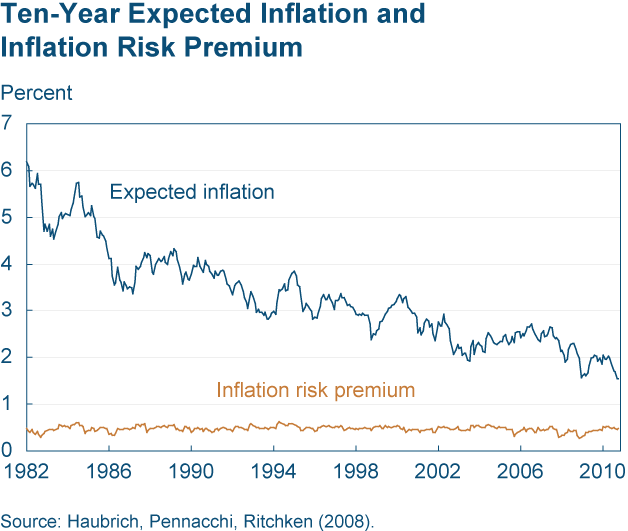
Figure from Cleveland Fed, accessed 11/11/10.
In other words, the market-based indicators do not suggest a burst of substantially higher inflation is imminent. Of course, even under the rational expectations hypothesis, big errors can occur (rat-ex only implies the t+i i > 0 errors are unpredictable based on time t information).
I don’t have survey based measures of expected inflation dated after QE2 became likely. In Figure 3, I show data up to the August Survey of Professional Forecasters (new forecasts will be released next week).
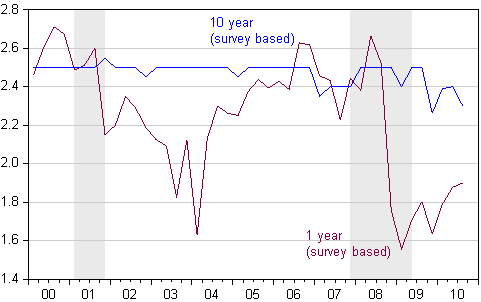
Figure 3: Median expected 10 year CPI inflation (blue) and 1 year CPI inflation (purple). recession dates shaded gray. Quarterly observations pertain to mid-quarter month. Source Philadelphia Fed Survey of Professional Forecasters, NBER, and author’s calculations.
Note that none of the above rely explicitly upon a macro model — that is, I’m not appealing to a Phillips curve to make predictions of inflation (and hence am not directly relying upon the current output gap of between -3 to -6 percentage points of GDP).
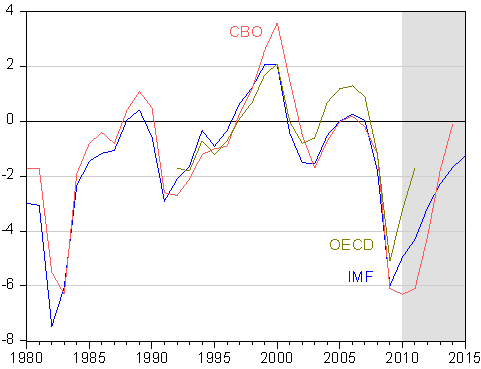
Figure 5: Output gap for the United States, from IMF, CBO, and OECD. Gray shaded areas denote forecasts. Source: IMF, World Economic Outlook (October 2010), CBO (May 2010), and OECD Economic Outlook (May 2010).
See also Jim’s take on the impact on both inflation, and relative prices.
But…but…but…but…Glenn Beck said that QE2 would bring on the “Weimar Republic moment” and “Zimbabwe tried it.”
http://www.youtube.com/watch?v=gk33gnUvCgc&feature=player_embedded
Menzie, are you trying to tell us that Professor Emeritus Glenn Beck and noted Fed Watcher Sarah Palin are wrong? Say it ain’t so.
2slugs,
I’m shocked to learn that you watch Glenn Beck. I have some inside information that might help you. A rogue agency of the federal government is about to mandate that Fox News show horrific images of tea party violence during the Beck show in an effort to dissuade viewers from watching Beck. The strategy is similar to the mandate that tobacco companies place horrific images on packs of cigarettes. Yikes!
I think the big unknown regarding future inflation is the FED’s exit strategy. If banks finally start lending, then the $1T to $2T in excess reserves, http://research.stlouisfed.org/fred2/series/EXCRESNS (Current $1T + .6T from QE2), the money multiplier will kick in with an associated increase in velocity. I am a firm believer in inflation as a monetary phenomenon, so it takes growth in M to create inflation. Can the
FED pull money out of the economy faster than the banking system can create it through our fractional reserve system? Technically, the answer is yes, but with what impact on growth?
That’s the reason Menzie’s model does not find much in the way of future inflation. Nobody knows if/when those excess reserves will start flowing into the economy in a meaningful way. It’s not possible for the government to intervene in a market the way the FED has without some serious distortions popping up at some point.
I don’t see how we get to hyperinflation, because there is no reason for the FED to continue to increase the money growth rate over a sustained period. I do wonder what will happen if we get a spike in inflation in 12-18 months and inflation expectations come unhinged.
However you define inflation the present is not important. Food, clothing, and fuel prices are increasing. Clothing will cost significantly more by late summer 2011. The consumer will percieve the price increases as inflation and quickly assign the blame to QE2 as well as other pro growth programs.
Ask “people” what price inflation they expect if china escapes from its “dollar trap”.
Ask the lower and middle class what they expect price inflation to be vs. their budget.
Are you using “market” indictator(s) that are “run” by the rich?
2slugs,
I remember back when you thought Obama was the cat’s pajamas…even though he attacked Clinton in October 2007 because she didn’t have a “fix” for SocSec. How’s that looking today, my friend?
As far as the implied measures of inflation expectations, I would like to know what Nassim Taleb thinks of combing through this data. There are no survivors among the bond market players who have bet on higher inflation-the entire population consists of investors and traders who bet that bonds go up… along with some Central Banks. Does that mean there will never be significant inflation?
While Krugman is now claiming that the issue is polarized along political lines, there are many who would never vote for Palin (or Beck) that think QE2 will not be effective in one way or another.
Japan conducted QE driving long term rates down to 1%. Where is the hyperinflation in Japan and devalueing of the Yen? OPEC largly controls inflation (which is really not inflation, just a supply side price shock that works its way through to other prices).
A horse for one person is expensive, but a horse for two is twice cheaper !
Domain of definition of the inflation please?
Where is the definition of inflation when food ,energy (USA),household basket index is a list of variable items (France),housing ownership,rentals, prices are excluded from the legitimate needs?
Where is the inflation when the official figures are raw fraud ?
SGS inflation
http://www.shadowstats.com/alternate_data/inflation-charts
Is it money supply ?
http://www.shadowstats.com/alternate_data/money-supply-charts
Is it inflation expectation a la 2006
http://www.shadowstats.com/alternate_data/money-supply-charts
Is it credit supply?
Assets at Banks whose ALLL exceeds their Nonperforming Loans (LLRNPT)
http://research.stlouisfed.org/fred2/series/LLRNPT?cid=93
How about the buffet my neighbors “a la Joan Robinson” through exported money supply and exported property bubbles?
When is the horse for two, becoming the horse of too many.
ECB’s Trichet Is Buyer of Only Resort as Debt Crisis Worsens Bloomberg
http://www.bloomberg.com/news/2010-11-12/ecb-s-trichet-is-bond-buyer-of-only-resort-as-euro-s-debt-crisis-worsens.html
tj There is a small risk that the Fed might not be able to unwind QE2 in an orderly fashion; but as you acknowledged, there is also a widespread belief that the Fed will not sustain increases in money. No one believes that this will be permanent, and I suspect that’s why we won’t see inflation. It’s not true that an increase in the money supply always and everywhere leads to an increase in the price level. That’s only true if the increase in the money supply is perceived as being a permanent increase, and no one thinks this will be permanent. That’s part of the reason QE2 is unlikely to have much effect.
tinbox I also criticized candidate Obama because his healthcare reform plan did not mandate coverage, as Hillary Clinton’s did. On the whole I think Obama has been on the right side of most issues. His problem has been that he doesn’t always press his views in a way that would make LBJ proud. In other words, Obama’s problem is that he pays his Republican foes too much respect and hasn’t yet recognized that most of them are just idiot hacks not worthy of respect.
“While Krugman is now claiming that the issue is polarized along political lines, there are many who would never vote for Palin (or Beck) that think QE2 will not be effective in one way or another.”
Well, that list would include Krugman himself. I don’t see him ever voting for Palin, but he also doesn’t expect QE2 will accomplish much. I think Krugman’s point is that political opposition to QE2 is not based on economic arguments, but on political arguments. If Obama supports QE2, then Fox News politicians oppose it. If Obama opposes QE2, then Fox News politicians support it. It’s economic policy by tribal affiliation. I suspect that many in the GOP worry that QE2 just might work. Sen. Mitch McConnell has already admitted that his first priority is making Obama a one-termer, and the mere chance that QE2 undercuts that prime directive is reason enough for him to oppose it. But as I read Krugman, most of his fire is directed at Very Serious People, and no one would include Palin and Beck in that group.
Given our options QE2 is about the only game in town so it’s still worth doing even if I don’t expect it to move the dial very much.
Menzie: “Of course, even under the rational expectations hypothesis, big errors can occur (rat-ex only implies the t+i i > 0 errors are unpredictable based on time t information). ”
Just out of curiosity, does the forecast of 1.6% expected inflation also come with standard errors?
“Expected average inflation over the next five years is still below the rates implied over the entire 2004-2007 period.”
That’s what is so incredibly disengenuous, or simply stupid, about the Paul Ryan types. In the middle of a boom this level of inflation was fine, now it’s a step away from Zimbabwe?
After the 2012 elections, when Palin takes over,the “rational expectations hypothesis” will get really funny.
But, let us read GWBushs new book about his smart decisions first, so we can enjoy the ride down the road to inflation …
tj: Just to clarify, it’s not “Menzie’s model”, it’s an approach straight from an undergraduate money and banking textbook.
LB442: According to the latest BLS CPI release, the food, fuel and apparel components of the CPI have risen 1.4%, 2.9% and (-1.2%) from September 2009 to September 2010.
Get Rid of the Fed: Just curious — so you are saying the expectations by those of higher incomes are systematically wrong — that is period after period, they continue to under-estimate inflation? This would be an interesting thesis to investigate; to my knowledge, nobody’s detected this bias, but I would like to be informed if someone has.
Robert Bell: For survey based expectations, I could calculate the standard deviation for the individual forecast errors if I had the individual responses in a survey (or I could calculate the root mean squared forecast errors if I only have the means). These are probably in the SPF releases somewhere, but I haven’t checked.
ppcm: I am not certain what point you are getting at. In any case, I think you should read Jim Hamilton’s posts regarding shadowstats [a] [b] before you continue to cite in polite company.
“Secret Walmart Survey Shows Inflation Already Here”
http://www.cnbc.com/id/40135092
Steven Kopits: Whoever wrote the article should’ve read this post, as well this more recent post. This is not to say the Walmart index is “wrong”, but rather that it might not be representative of total consumption.
Sarah Palin says inflation is up. That was in response to the WSJ saying that inflation is down. She spanked them because she’s authentic and that trumps fact.
tj: Just to clarify, it’s not “Menzie’s model”, it’s an approach straight from an undergraduate money and banking textbook.
Menzie, please forgive my carelessness. I should have said, “the model Menzie refers to”. I didn’t mean to imply it was ‘your model’.
If only we could all afford these undergrad textbooks you refer to. ; )
Reuter/Michigan inflation expectations @ 3% and climbing. Explanation for the increase is that fewer expect deflation.
Professor Chinn
Went through the Paashe and Laspeyes prices indices and their assumptions, where both assume income as a constant.
Paashe is setting the income as constant and assume that over a period of time the consumption behaviour is the same setting accordingly the quantities of the same goods consumed.
Laspeyres index introduces the same consumption pattern as a function of quantities of the same goods consumed with a constant income where q (quantities consumed) becomes the numeraire.
They are parameters that would need to be more acquainted with such as, representativity of the selected bundles of consumers?
Population growth may drive an increase of prices without altering the q (same quantities of the same goods consumed). Should my understanding be correct, no price change since q remains the same.
Correlatively incomes may have changed rentals prices,housing prices,oil prices may have increased but the quantities consumed of the same bundles of goods remaining the same, prices did not.
May I just copy the following comment (wikepedia)
“This new index, however, doesn’t do anything to distinguish growth or reduction in quantities sold from price changes. To see that this is so, consider what happens if all the prices double between t0 and tn while quantities stay the same: P will double. Now consider what happens if all the quantities double between t0 and tn while all the prices stay the same: P will double. In either case the change in P is identical. As such, P is as much a quantity index as it is a price index.”
On money supply and SDS
Since the Federal reserve has opted not to publish M3, Shadowstats provides for an attempt to represent such data.If not accurate, reliable,but disputable representation of this statiscal element.Let us see if SDS is consistent with the ECB (assumptions EEC M3 and USA M3 are correlated)
ECB M3 P15
http://www.ecb.int/pub/pdf/mobu/mb201011en.pdf
SDS J Williams M3
http://www.shadowstats.com/alternate_data/money-supply-charts
Looking for Joan Robinson or a horse for two?
Went through BIS statistics P44 “External loans and deposits of reporting banks vis a vis all sectors”
http://www.bis.org/statistics/provbstats.pdf#page=8
UK LOANS TO DOMESTIC ECONOMY IN GBP 517 BILLION POUNDS ( wondering how much of a GDP that is, when compared to France and Germany loans to domestic economy)?)
UK loans to other countries 3.794 Trillions euros
These above posts are in need of a conclusion,what about ?
“My kingdom for a horse”
breakeven inflation rates from inflation swap market 2Y 1.3% 5Y 1.9% 10Y 2.5% 3oY 3.0%
more interesting to look at distribution of inflation expectations from the options market tho, where there is a clear tilt towards higher inflation, eg, at the 5Y horizon 19% chance of deflation, 9% chance of inflation between 0 and 1%, 26% between 1 and 3% 14% between 3 and 4%, 11% between 4 and 5% and 22% of more than 5%
While everyone is focused on an increase in the inflation rate due to the Fed’s creation of possible purchasing power through QE2 we should remember that an increase in money, or purchasing power, is only part of the inflation equation. Before the new money can be inflationary it must first be chasing goods, services, or investments. If the new money ends up paying off old debt it will not be inflationary. If the new money ends up in stock markets overseas the only thing that will be inflated will be overseas stock markets. We think most of the QE2 money won’t end up pursuing consumer goods in the United States so the effect on our CPI will be minimal at least for the next two or three years.
tj: You can get the 7th edition of Mishkin’s “Economics of Money and Banking”, used, for $11.36 from Amazon…so no excuse.
“Get Rid of the Fed: Just curious — so you are saying the expectations by those of higher incomes are systematically wrong — that is period after period, they continue to under-estimate inflation? This would be an interesting thesis to investigate; to my knowledge, nobody’s detected this bias, but I would like to be informed if someone has.”
Sorry I didn’t get back sooner. I’m saying that I believe that CPI and a middle class person’s budget are not the same with a middle class person’s budget being higher.
I will try to find some examples beyond simple health care and education.
Mr Chinn you are wrong to look at TIPS as a market indicator for inflation expectations, the FED actively buys them, thus pushing yields and inflation break evens down. They are manipulated simple as. Please get out on the street and tell me if a beer has increased in price, if hedonic adjustments are viable does it really matter how many pixels are in my tv? Fact is inflation HAS gone up im getting poorer and cannot afford as much. To say there are no inflation expectations is wrong, ask the man on the street not the manipulated TIPS market…..